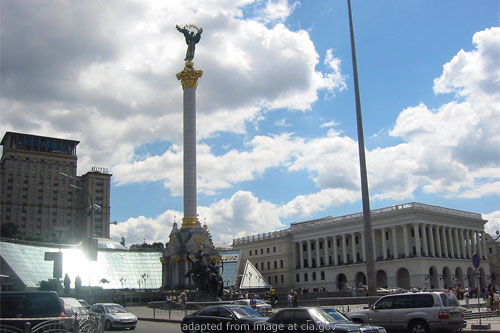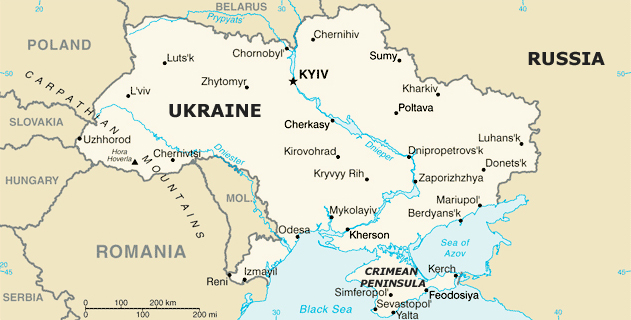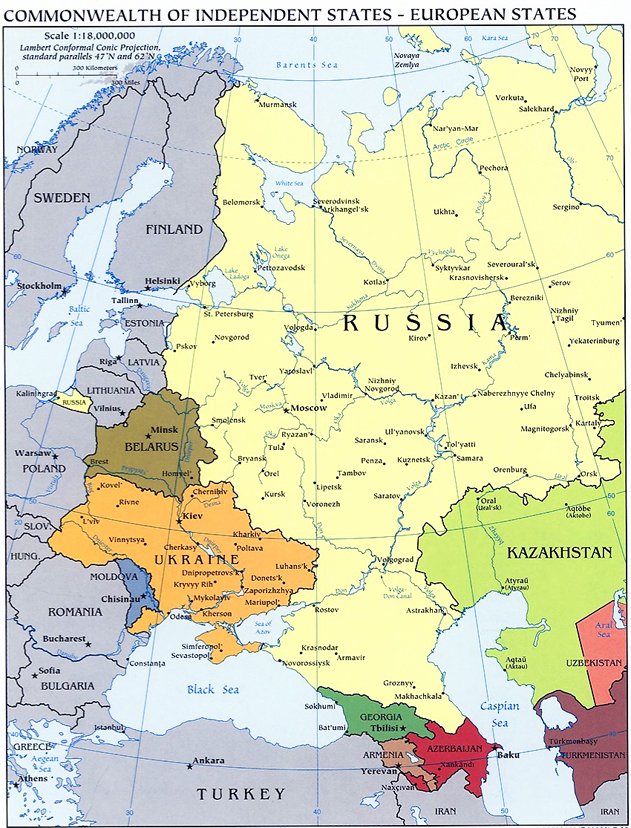Reflections on Russians and Ukrainians

From: Kirk Bennett (kirkbennett7@yahoo.com)
Date: September 24, 2014
Subject: Reflections on Russians and Ukrainians
Kirk Bennett is a former Foreign Service officer who served in both Moscow and Kyiv. The opinions expressed are his own and do not represent the views of the U.S. government.
Amid all the analyses of the crisis in Ukraine there is a subtle element of the conflict between Russians and Ukrainians that has barely been alluded to, and which I have not seen treated systematically anywhere. It explains in large measure a Ukrainian paradox – why, despite the overwhelmingly positive attitude of Ukrainians toward Russia and Russians since the breakup of the Soviet Union, there has never been a strong pro-Russian camp in Ukrainian politics.
It is instructive to observe the attitudes of Russians toward Ukraine, and of Ukrainians toward Russia, over time. Russian sympathy toward Ukraine and Ukrainians has moved virtually in lockstep with the climate of bilateral relations, plunging at times of tension and recovering as political relations normalized. Curiously, the opinion of Ukrainians toward Russia and Russians has hardly budged even during the Orange Revolution and the various gas wars, with Ukrainians irrepressibly well-disposed, by all accounts, toward their mighty northern neighbor, even when political relations were difficult.
Nevertheless, these positive feelings have never translated into any serious Ukrainian political force prepared to align the country with Russia. Groups beholden to Moscow have been marginal players, such as the Communists and the various movements led by Viktor Medvedchuk. Much recent commentary – even by some people who ought to know better – has portrayed last winter’s confrontation in Kyiv as a black-and-white struggle between anti-Russian demonstrators and a pro-Russian government led by President Yanukovych. The latter was most assuredly not pro-Russian, nor pro-Western, but simply pro-Yanukovych. Cheerfully free of any ideological predisposition, loyalty or moral scruple, the Yanukovych “family” ruled purely on the basis of self-enrichment, and shamelessly sought whatever foreign support or favors it could gain from any quarter. Yanukovych’s abrupt reversal on the EU Association Agreement was not an attempt to steer Ukraine in a different, pro-Russian direction, but a simple calculation of short-term gain. Even after the fact, his government showed no particular interest in Putin’s flagship Eurasian Union project, and maintained that the country’s goal remained integration with Europe – contingent on securing “better terms” for Ukraine from Brussels.
The notion that the demonstrators on the Maidan were anti-Russian also bears reexamination. How, indeed, could a broadly based “anti-Russian” movement emerge in a country where 75-80% of the population consistently professed pro-Russian sentiments? Indeed, many Russian analysts are convinced that the Maidan was not a popular movement, but simply another chapter in the West’s untiring campaign to do Russia down. In fact, this analysis simply fails to recognize the disconnect between Russian and Ukrainian perceptions of what it means to be “pro-Russian.”
In Moscow, “pro-Russian” is understood almost entirely in political terms, especially support for Russia’s integration agenda in the former Soviet space. With this frame of reference, Russian pundits have long complained – with complete justification, from their perspective – that there has never been a genuinely “pro-Russian” government in post-Soviet Ukraine.
Ukrainians, for their part, have tended to think in linguistic and cultural terms. Almost all Ukrainians speak Russian fluently, and many of them use it as their principal – or even sole – language. Linguistic facility has led Ukrainians to embrace the richness of Russian culture as well, and to take pride in the Ukrainian connection of such luminaries as Gogol, Chekhov and Bulgakov. A Ukrainian woman of my acquaintance, a doughty Ukrainian patriot, was determined that her children grow up reading the great works of Russian literature in the original language. And why not? There was no contradiction between valuing one’s own Ukrainian culture and treasuring a kindred culture boasting world-renowned geniuses. There was no need to choose – Ukrainians could have them both.
The situation begs a question – why has the deep linguistic and cultural affinity of most Ukrainians for Russia not translated into a pro-Moscow political orientation? I think there are basically two reasons.
First, the incalculable contribution of Russia in all areas of culture has not been matched in the field of governance. Ukrainians, disgusted by the venality of their own rulers, could hardly look to emulate their equally corrupt and oligarch-ridden northern neighbor. Moreover, the towering historical figures of Russian statecraft – Ivan the Terrible, Peter the Great, Catherine the Great, and Stalin – are revered for power, not justice. Europe presents an alternative model of governance that, whatever its shortcomings, offers citizens basic dignity and respect for rights. People do not really yearn for democracy, which is no guarantee of good governance. Rather, they yearn for justice – a commodity in critically short supply in the post-Soviet space – and Ukrainians generally saw in the EU their best hope of obtaining it. However, Ukrainians did not, for the most part, view a European orientation as a repudiation of Russia and its cultural riches, and likewise hoped to maintain strong economic ties with their largest single trading partner. Once again, there was no need to choose. Ukrainians could have it all – their own national identity, close economic and cultural ties with Russia, and the basic fairness and dignity of a European vocation.
Second, and more importantly, Ukrainian love and admiration for Russia are largely unrequited. In contrast to their bilingual Ukrainian neighbors, ethnic Russians in Ukraine are remarkably impervious to the Ukrainian language. Russians are inclined to perceive Ukrainian not as a separate language – eloquent, expressive and poetic in its own right – but as an illiterate dialect of the language of Pushkin. It is deeply galling for Ukrainians to speak their language in their own country and be met with genuine or feigned incomprehension, often tinged with contempt, from monoglot Russians. The resentment engendered explains the negative reaction of so many Ukrainians to the idea of creating special privileges in Ukraine for the Russian language.
Unfortunately for Russian-Ukrainian relations, many Russians view Ukrainians simply as defective Russians, and Ukraine as an artificial state cobbled together largely from supposedly “Russian” lands. In the extreme Russian view, the only real Ukrainians are the inhabitants of Galicia; the remaining population of Ukraine is comprised either of Russians, Malorossy (“Little Russians” – people who, despite their local peculiarities of speech and custom, acknowledge their basic Russianness), or khokhly. The latter term is an ethnic slur connoting wily peasants, incorrigibly stubborn and willfully ignorant – above all in their insistence on a separate ethnic identity.
There is a new ethnonym in Ukraine that has emerged from nowhere in recent months – Novorossy, the inhabitants of Novorossiya or “New Russia.” It is worth taking a moment to ponder this curious entity, for its brief and inglorious existence illuminates a great deal about the course of recent events in Ukraine.
Novorossiya was a term used briefly in the late 18th century to designate the territory on the northern shore of the Black Sea ceded to Russia by the Ottoman Empire. At the time, there was not a single Russian village in the entire length and breadth of “New Russia.” Therefore, when Catherine the Great embarked on a tour of her new domains, her favorite, Grigoriy Potemkin, constructed his now-legendary Potemkin villages to create for the monarch a facade of prosperity.
The Potemkin analogy is entirely appropriate for Russian efforts to revive the idea of a Novorossiya in southern Ukraine. There has never been a group of people who considered or called themselves Novorossy. They are a completely Potemkin people invented to populate the spectral Potemkin villages from the time of Catherine the Great.
As Ukraine was convulsed by unrest in late winter, Moscow evidently thought it need only proclaim the resurrection of Novorossiya in order to sunder Ukraine in two and draw the entire Russophone south and east into the bosom of Russia. The campaign flopped. The sheer artificiality of the concept is shown by the fact that the Donbass – the only portion of Ukraine where the idea gained any traction whatsoever – was not even a part of the historic Novorossiya. The abject failure of the Novorossiya project has ended any hope of bringing all or most of Ukraine voluntarily into Moscow’s orbit. However resolutely Moscow tries to stick the Novorossiya label on whatever Ukrainian territory it controls, the idea has virtually no resonance among Ukrainians themselves.
For all their historically warm feelings toward Russia, Ukrainians do not view themselves as incomplete Russians. They see themselves and Russians as fraternal but separate nations, in contrast to the oxymoronic Muscovite notion of “a single fraternal people” – which views the Ukrainians as something akin to an undigested meal.
Ultimately, Ukrainianness must be defined as that which is “other” and different from Russianness. It is that sense of a cherished separate identity that sets even Russophone, bi-cultural Ukrainians apart from ethnic Russians. It is the root cause behind the spectacular failure of the Novorossiya idea to take hold in southern and eastern Ukraine.
The “Russian Spring” has sent a frosty north wind down upon Ukraine. Russia has risen from her knees – and come out swinging against her neighbors. Russians might think they are striking blow after blow against Western arrogance and world domination, but it is Ukraine that actually lies bruised and bloodied at Russia’s feet. Russians might believe they have righted a great historical wrong by annexing Crimea; Ukrainians see only a treacherous and deceitful land-grab at their expense. Russians might imagine they are in Ukraine killing fascists and Western hirelings; Ukrainians see the dead soldiers as their own sons and husbands – and as patriots.
With their gambit in Ukraine, Russians run a risk worse than the loss of “Bush legs,” Polish apples or French cheese, more profound than isolation from the West, more severe than recession and economic hardship. The risk is that 2014 might go down in history as a watershed year in Russian-Ukrainian relations – and that Ukrainianness might come to be defined not simply as non-Russian, but as anti-Russian.


